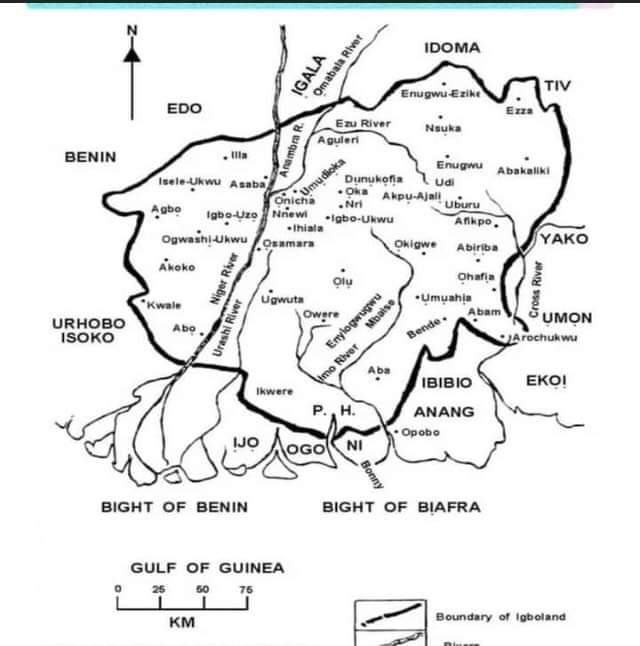Forgotten Dairies
Igbo Had No Business With The Itshekiri: A Historical Perspective -By Maazi Ogbonnaya
Ginuwa, the Itsekiri founder and first olu (king), was originally a prince of Benin, so that subsequent kings are descendants of the Ọba of Benin. Lesser chiefs once met as a council and advised the olu. Chieftaincy is being redefined in conformity with modern government, and some settlements do not participate in chieftaincy at all

Look at this map very well. When the Portuguese arrived in the 15th century, they partitioned two main places they traded. Bight of Benin and Bight of Biafra.
The word “Biafra” is a Portuguese name, not an Igbo name. Bight of Biafra was bigger than Bight of Benin.
The Igbo hinterland, Ibibio, Efik and all the tribes found in old Calabar, Rivers were all under Bight of Biafra.
You can see the rest by the left under Bight of Benin. Bight of Benin was also known as Slave Coast.
There was later a Bight of Bonny which was formerly under Bight of Biafra.
The European slave traders who operated majorly under the Bight of Biafra include: Daniel Backhouse, William Boats, William Davenport, George Case and John Shaw.
At this time, slave trade was a huge business all over Nigeria. The Benin Empire comprising Itshekiri, Urhobo, Edo and co were dealing in slave trade, selling their own people. The same way Igbo and Yoruba and Efik, in fact everyone was doing the same business.
The Igbo slave traders had two concentrated Seaports they focused on under the Bight of Biafra. Such ports are: Calabar Port and Bonny Port. Bonny was the busiest. The Yoruba were doing theirs in Badagry, having the highest slave concentration. Badagry to Benin Republic.
How do you expect an Arọ man to leave Calabar and Bonny closer to him, under his own territory to travel long distance of Benin to trade in slave or Itshekiri?
The Igbo who did business with Bini traded in bronze, copper, medicine, etc. Igbo were known also for herbs and healing.
When you read “Igbo Worlds” by Professor Elizabeth Isichei, it states that most people in Anịọma didn’t have any encounter with the Arọ but Nshi people. Nshi was the name Nri was called in the past. The progenitor of Ọgwashị-Ukwu was an Nri man.
The business of the Igbo slave dealers was working as middlemen. They get slaves, hand over to the European trade dealers, collect their money and hunt for others. This was the same business with other tribes in Nigeria as at that time.
Igbo were travelers. They did businesses with Benin as I said earlier. Most account established that Eze-Chima— a progenitor of Ọnịcha was a medicine man to Ọba. The question is, Eze Chima is it an Edo name?
Ọba of Benin needed the Igbo working for him more than the Igbo working for him needed him. His personal medicine man had to return to hinterland. He came back with all his family. Of course there must have been mixture of Edo people in that journey, hence Ọnịcha is founded through Eze Chima.
Itshekiri had the first encounter with the Portuguese in 15th century. They were also amongst the first to get western education. They traded in slave trade as well. There was no way Itshekiri man could find his way to Igbo land to enslave anyone. They worked as middlemen, handling their own people to the Europeans just as every other person was doing. Those in Benin Empire would get slaves, Itshekiri people would help and pass them to the European trade dealers.
Itshekiri currently has no dialectal variations which experts said must have been caused by their early contact with the Europeans and mixture of slaves who couldn’t find their ways but settle there. How can those slaves assuming they are Igbo form their language, still remain there, whereas the Itshekiri has no dialectal variations like other languages? Itshekiri had no business with Igbo but Bini, Yoruba, Ịjọ. It was grouped under the Yoruboid.
Ginuwa, the Itsekiri founder and first olu (king), was originally a prince of Benin, so that subsequent kings are descendants of the Ọba of Benin. Lesser chiefs once met as a council and advised the olu. Chieftaincy is being redefined in conformity with modern government, and some settlements do not participate in chieftaincy at all.
In that axis, Itshekiri served as middlemen for Europeans, getting goods from Bini empire and supplying to Europeans. Such goods include humans, palm oil, bronze, copper, etc.
The Portuguese also made their ways to other regions. That was when Igbo called them ndị Potokiri.
“The British broke the Itshekiri trade monopoly in 1890’s then the flourishing Itshekiri economy went into decline” (Encyclopedia Britannica)
Remember, the Igbo gave the colonial administrations headache. Is it the Edo or Itshekiri that could enslave the Igbo? Even if you accuse Anịọma of being slaves to Edo or Itshekiri are you referring to Anịọma Igbo that fought Ekumeku resistance for 30 years against the British intrusion? With all the European sophistications, the Igbo fought them and dealt with them, frustrate them, na small Itshekiri or Edo go enslave them?
Remember, the Igbo sold to the Europeans by their kins, many refused. Instead of being slaves, they killed themselves. Many jumped into the sea. Read about the Igbo landing in America. They said over their dead body, being slave? They jumped into the water and got drowned.
That shows who the Igbo are. You can’t just wake up and toy with them, then go scot free. They rather die than allowing you enslave them.
© Maazị Ogbonnaya
Twitter: maazi_ogbonnaya


















